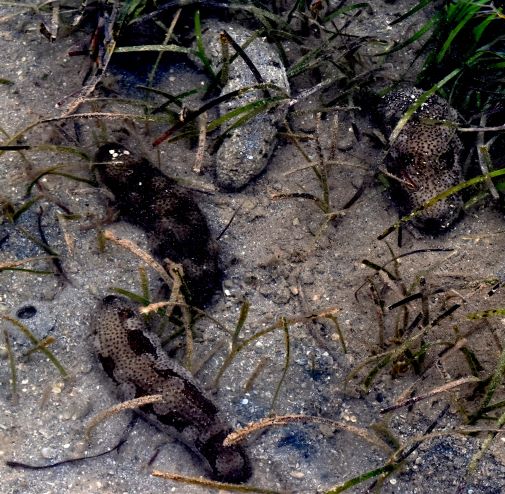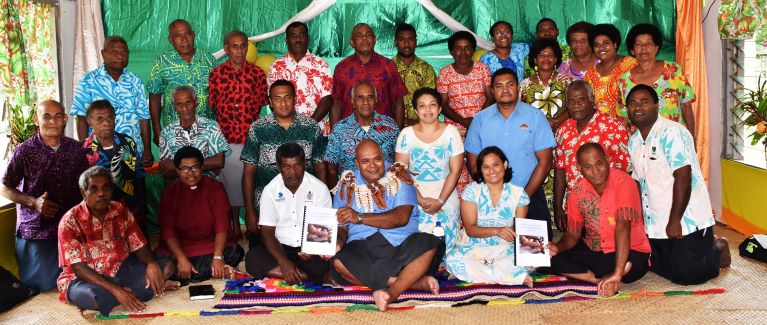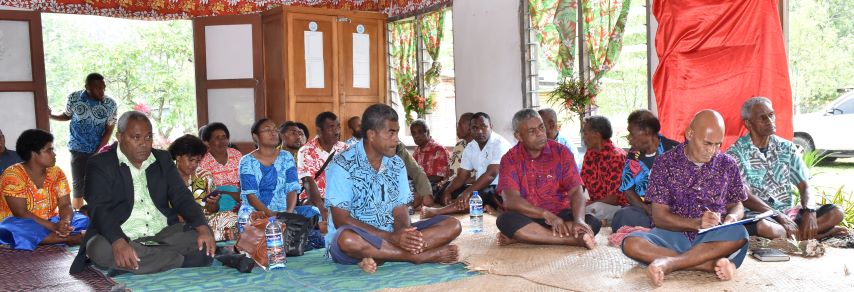The sea cucumber fishery is an important source of income for the people of Natuvu village in the District of Wailevu in Cakaudrove Province on Vanua Levu. Of the 30 sea cucumber species present in Fiji, 14 are most valuable to the fishers of Natuvu. However, the rapidly declining fishery and its inconsistent prices have concerned the villagers over time.
Therefore, to ensure the continuity of their livelihood for generations, the people of Natuvu village have committed to putting the right management measures in place to ensure the long-term sustainability of their sea cucumber fishery. As such, the country’s first community sea cucumber management plan was officially launched at Natuvu village today (3 September 2020).

Sea cucumber in the waters of Natuvu village. ©Arishma Devi/WCS
The management plan was developed by the Natuvu villagers and their traditional leaders with support from the Ministry of Fisheries and the Wildlife Conservation Society (WCS) through several consultations between 2016 and 2019. The plan aims to address the social, economic, and ecological issues associated with harvesting and processing of the fishery which were identified by men and women fishers during the consultations.
One of the key problems highlighted by the villagers during the consultations was the lack of consistency in the prices for processed sea cucumbers, declining population of the sea cucumbers and a lack of knowledge regarding post-harvesting processing practices for different species to ensure product quality.
 The people of Natuvu village, their traditional leaders with the Commissioner Northern Uraia Rainima (sitting left) and the Wildlife Conservation Society Fiji Country Program Director, Dr. Sangeeta Mangubhai at the launch of the sea cucumber management plan 2020-2024. ©Arishma Devi/WCS
The people of Natuvu village, their traditional leaders with the Commissioner Northern Uraia Rainima (sitting left) and the Wildlife Conservation Society Fiji Country Program Director, Dr. Sangeeta Mangubhai at the launch of the sea cucumber management plan 2020-2024. ©Arishma Devi/WCS
By putting in place a management plan, the community are being proactive so that in the future, once stocks recover nationally and harvesting is allowed again, Natuvu village will be in strong position to reap the benefits in a sustainable way.
The Commissioner Northern, Uraia Rainima expressed his gratitude to the people of Natuvu and their leaders for their support towards developing and implementing the plan for the benefit of the sea cucumber fishers.
Recalling how the fundraising through sea cucumber fishery contributed to the building of the village’s first secondary school and their community hall, a decade ago, Mr Rainima said, “even without the management plan, you (the villagers) were able to achieve so much from the fishery, so imagine how much you can achieve with the management plan in place, should the ban on the fishery lift.” Between 2008 and 2017, Natuvu villagers opted to periodically harvesting the sea cucumbers in their waters to ensure its sustainability.
As part of the plan, the villagers will adhere to the recommended size limits for harvesting the sea cucumbers and will receive training on post-harvest processing of sea cucumbers. Additionally, two fish wardens will receive training to ensure fishers comply with the rules in the management plan. The implementation and enforcement of the plan will be monitored by the Natuvu Development Committee.
 Natuvu villagers during the launch.
Natuvu villagers during the launch.
There is a long tradition of sea cucumber harvesting in Fiji for Asian markets. In the 19th century sea cucumber trade became Fiji’s major export earner which also contributed to the significant over-exploitation of the fishery. However, since 2015, the Ministry of Fisheries has been working closely with the WCS on the health of sea cucumber stocks and to put in place management measures to assist in the recovery of this severely depleted fishery. Multiple scientific studies and assessments undertaken up to 2017 had showed how decimated stocks were, and that without any management intervention, many sea cucumber species would become locally extinct.
To ensure the recovery of the fishery and safeguard the long-term livelihoods for local communities and businesses, a ban (or moratorium) was placed on the exporting and sale of all sea cucumber species from late 2017 and remains in force today. This issue of depleted stocks and use of moratorium for this fishery is not unique to Fiji, and has been experienced by most Pacific Island countries. Moratoria are not a preferred management intervention for any management agency, but are often used when a fishery has gone past a tipping point, the fishery will not recover unless there is a cessation of harvesting.
Wildlife Conservation Society Fiji Country Program Director, Dr Sangeeta Mangubhai said “the recovery and wise management of fisheries resources do not just lie with the government. Throughout Fiji, the sea cucumber fishery has been an important source of income for coastal communities, especially in rural areas. Communities such as Natuvu village know all too well how valuable this resource is to them.”